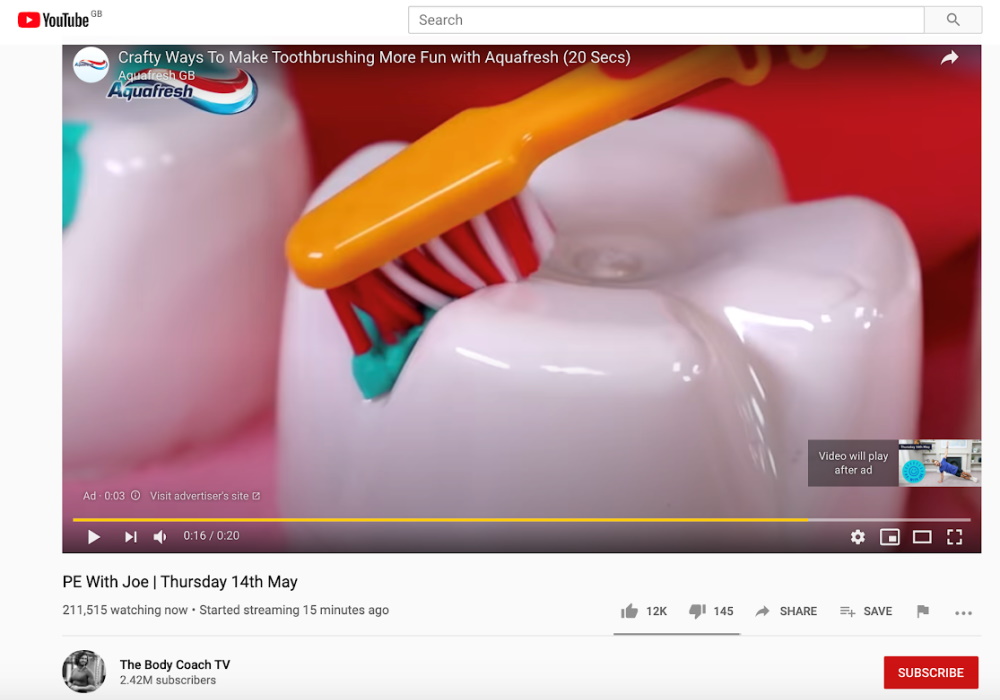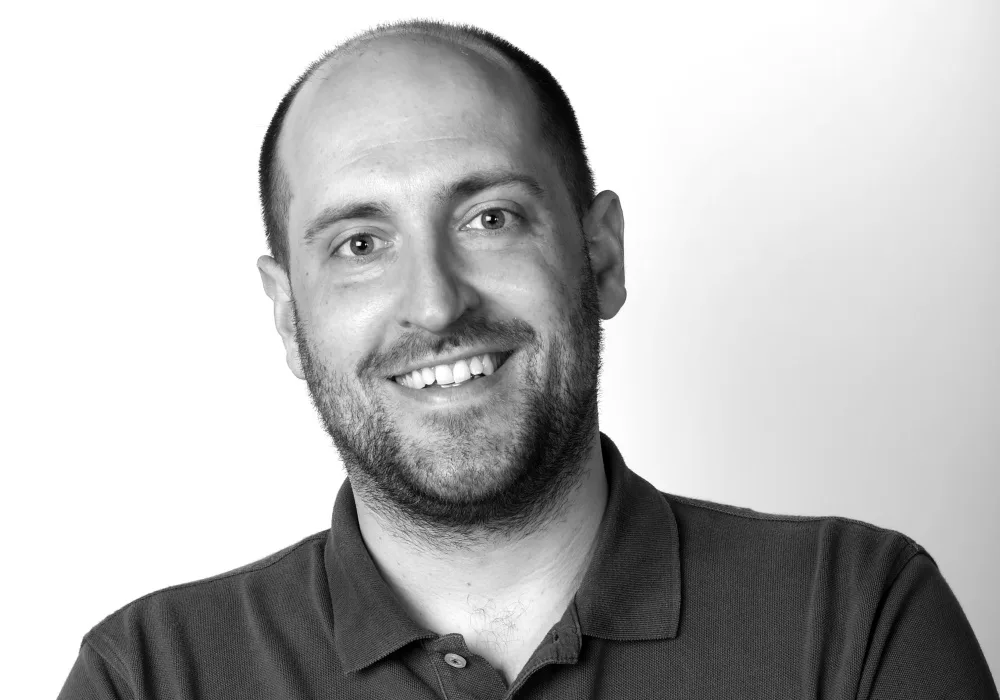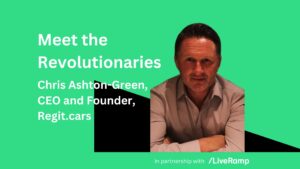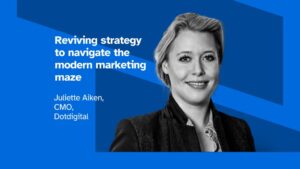The past 12 to 18 months has been filled with incidents and events that have transformed the way we live our lives and the conversations we are having both inside our homes and outside in the wider world.
One of the areas that has been at the centre of more conversations is health, particularly as a result of the pandemic we have been dealing with. People are have become far more conscious of their health and been proactively looking for things to improve their health, rather than waiting for something – like the coronavirus – to force them to make changes instead. At the same time, people have had to seek out different ways to buy their health-related products.
“Shops have been shut and people have found different ways of buying things. But that’s definitely been a learning journey for people who haven’t thought about buying pharmaceutical or health products, or even groceries, online,” says Jerry Daykin, EMEA Senior Media Director at GlaxoSmithKline (GSK) Consumer Healthcare.
“Health is much more on people’s minds than it was before. Hopefully, people are always somewhat conscious of their health, but these days you talk about it relentlessly. How are you keeping clean? How are you keeping safe? How are you taking proactive measures around your health? So, we’ve seen a real spike in more proactive healthcare and people wanting to take more care of themselves. And, again, it’s meant consumers leaning into different media, searching for things they would never have thought about searching for before.”
Adapt to thrive
GSK, like many businesses, has had to react to the ways the pandemic has transformed the world. An example of this is when GSK oral health brand Aquafresh sponsored Joe Wicks’ YouTube pandemic family PE lessons for a month and delivered content around it to show parents other things they could do with their kids at home.
Similarly, in Germany, the Voltaren brand (that’s Voltarol for all you UK peeps) quickly launched a website when it saw that ‘back pain’ related searches were spiking as people struggled with their work-from-home setups. The website featured exercises that could be done while at home to continue to stay agile and mobile.
“It’s forced a lot of interesting change for us,” says Daykin. “Consumers have clearly changed a lot of their behaviour in the last year and a half. I think some of that will definitely stick and we’re working hard to make sure we’re ahead of that.”
Daykin feels its important for businesses to continue to be agile even beyond the pandemic, stating that agility is one of the values of GSK. Despite this, he explains that ‘agility’ doesn’t always mean responding to everything immediately – sometimes it’s just about being open to change and adapting.
Moreover, he warns that businesses should be aware of overreacting because “consumers are still consumers, they still have a lot of the same interests, passion points, desires, they still mostly think in the same way”.
“A key one for us has also been looking after our teams, agencies, and partners. Being agile is great, but it can create a lot of work and you can become overburdened,” Daykin adds. “So, prioritise where you’re going to be agile and make sure you don’t overwhelm people with unnecessary requests. And that means that, as well as looking after the health of our consumers, we can look after the health and wellbeing of our own people.”
And looking out for employees has been at the heart of what GSK does for many years.

Representation for all
On top of COVID, the past 18 months has also seen the murder of George Floyd and the subsequent Black Lives Matter protests. It’s seen the murder of Sarah Everard and the stand against violence against women. It’s seen the fight against Asian hate. It’s seen protests for LGBT rights. Quite simply, a lot has gone on around diversity, equity, and inclusion (DEI) – and there’s still a fair few other incidents and events missing from that list.
At GSK, the Black Lives Matter protests sparked open and frank discussions, with people sharing their challenging and personal experiences. Meanwhile, Spectrum – the company’s LGBT employee resource group – has now been around for over 20 years, just to name a couple of examples of GSK’s support of its employees.
“If you look at our diversity and inclusion, we do huge amounts internally with our colleagues,” says Daykin.
“One thing that has become a bigger talking point in the industry is the role we have as marketers around the comms we create, the messages we put out, and the media we buy. As a business, we spend £1.5 billion on media and marketing and getting messages out there. How can we make sure that all of that is doing something in this space?
“I’m a gay man myself,” Daykin continues. “I think representation matters. I know what it’s like not to see myself included in media and advertising. Advertising has an unfortunate tendency to fall into stereotypes. For instance, women are often presented as a housewife or they tend not to be the lead protagonist. We really consider that and believe in holistic, everyday healthcare. We believe in building brands that have a human side to them.”
In the UK, GSK’s Sensodyne and Voltarol have an ongoing partnership with Gay Times and with the charity Pride Sports.
The marketing and advertising around Sensodyne has focused on casual representation, featuring different talent and influencers from the LGBT community eating hot and cold food and having painful teeth.
Meanwhile, Voltarol has focused on telling stories of sports clubs and how they’ve coped with COVID. And the partnership has provided training for LGBT sports clubs to be able to open up and provide resources and refuge for the LGBT community around those clubs.
“It’s in the DNA of the company, but it does rely on people thinking about doing it,” explains Daykin. “We know there’s unconscious bias and the marketing process is often quite rushed. So, we know that, even with well-meaning and people who believe in this, you have to really push yourself to build it in. But the focus is increasing and it matters more to people.”
Building an inclusive industry
Daykin also sits on the Diversity and Inclusion Council at Publicis, GSK’s media agency partner, so he gets to see some of the positive initiatives that are be developed in the industry first-hand. But – though he thinks the industry is positioned well to work on DEI – he acknowledges that there is still a long way to go when it comes to getting diversity and inclusion right internally.
“We’ve spent a lot of time focusing on the external representation. I think there’s definitely progress to still go on internal diversity and inclusion of our teams on the client side, on the agency side, and on partner sides. And that’s both in terms of making our industry more accessible to different people and then giving people a fair chance to accelerate through it. I know we don’t have that yet,” says Daykin.
“Sometimes people can get quite defensive about it. Nobody is saying that a straight, white, middle-aged man can’t do great marketing for all sorts of different, diverse communities. I’m a white, gay man and I can still do great marketing for women and black people and different audiences. It’s just important that you open your mind to hear other perspectives and that you’re willing to be challenged with insights and opportunities from those different perspectives. Most of us who work in marketing live in somewhat of a bubble – and we all need to get outside of that.”
Nonetheless, Daykin is confident that “the conversation is moving in the right direction” and believes the industry now has more of the right things in place to improve diversity and inclusion both internally and externally.
At the same time, he warns that businesses need to be consistent in their support of diversity and inclusion and not just display it when there’s a particular day, month, or event.
“If you’re going to stick your neck out and show support for one of these communities, you need to keep doing it and keep supporting it. Don’t just do a one-off thing for Pride Month or Black History Month and say you’re done. That’s why we’re trying to build it into our everyday DNA,” Daykin concludes.












